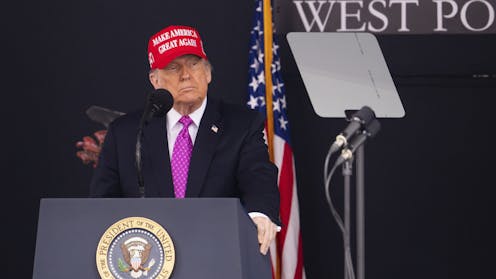Trump’s West Point speech brought partisanship to the home of the US military − 2 essential reads
- President Donald Trump’s speech at West Point included scripted and unscripted segments that showcased his partisan politics, making it unusual for a military setting.
- The level of partisanship in Trump’s speech was concerning, as it attacked presidential predecessors Barack Obama and Joe Biden, described immigrants as “criminals,” and promoted policy accomplishments from his first and second terms.
- West Point graduates took an oath to support and defend the Constitution against all enemies, foreign and domestic, emphasizing their commitment to serving the American people, not a particular person or political party.
- The military has traditionally been dedicated to serving the nation, not a specific person or political agenda, with nonpartisanship being central to its primary mission of defending the country.
- Trump’s actions during his second term raised questions about whether military personnel would stand up for the military’s independent role in maintaining American democracy or follow the president’s orders, even if they were illegal or unconstitutional.

President Donald Trump’s speech at the graduation of the class of 2025 from the U.S. Military Academy at West Point included segments that were clearly scripted and portions that were obviously not.
During the unscripted portions, Trump, who wore a bright red “Make America Great Again” campaign hat during his entire appearance on May 24, 2025, delivered remarks that hit many of his frequent partisan political talking points. That included attacking presidential predecessors Barack Obama and Joe Biden, describing immigrants to the U.S. as “criminals” and trumpeting other policy accomplishments in his first and second terms.
That level of partisanship in a military setting – on the campus of the nation’s first military academy, and before an audience of cadets and their families, many of whom are veterans – is unusual in the United States.
The Conversation U.S. has published several articles discussing the importance to democracy of keeping the military and partisan politics separate. Here are two highlights from that coverage.
1. Cadets focus on the Constitution
During the West Point ceremony, the graduates themselves took an oath to “support and defend the Constitution of the United States against all enemies, foreign and domestic.” And all of them had studied the significance of that oath, including in classes like those taught by Joseph G. Amoroso and Lee Robinson, active-duty Army officers who graduated from West Point and later served as professors there.
As Amoroso and Robinson wrote, those classes teach cadets that, like all military personnel, they serve the Constitution and the American people, not a particular person or political party:
“(O)ur oath forms the basis of a nonpartisan ethic. In the U.S., unlike in many other countries, the oath implies military leaders should be trusted for their expertise and judgment, not for their loyalty to an individual or political party. We emphasize to cadets the rules and professional expectations associated with this profound responsibility.”
2. A tradition of nonpartisanship
Retired U.S. Air Force Maj. Gen. Samuel C. Mahaney, who teaches history, national security and constitutional law at Missouri University of Science and Technology, observed:
“(S)ince the days of George Washington, the military has been dedicated to serving the nation, not a specific person or political agenda. … (N)onpartisanship is central to the military’s primary mission of defending the country.”
Mahaney wrote that if Trump’s actions during his second term meant a change from the centuries of precedent, “military personnel at all levels would face a crucial question: Would they stand up for the military’s independent role in maintaining the integrity and stability of American democracy or follow the president’s orders – even if those orders crossed a line that made them illegal or unconstitutional?”
Read more:
Trump’s firings of military leaders pose a crucial question to service members of all ranks
This story was updated to highlight two articles from The Conversation’s archives.
![]()
